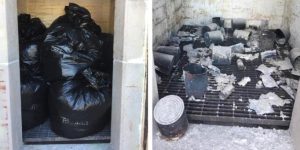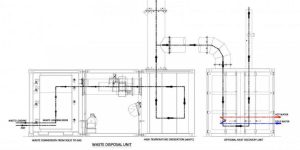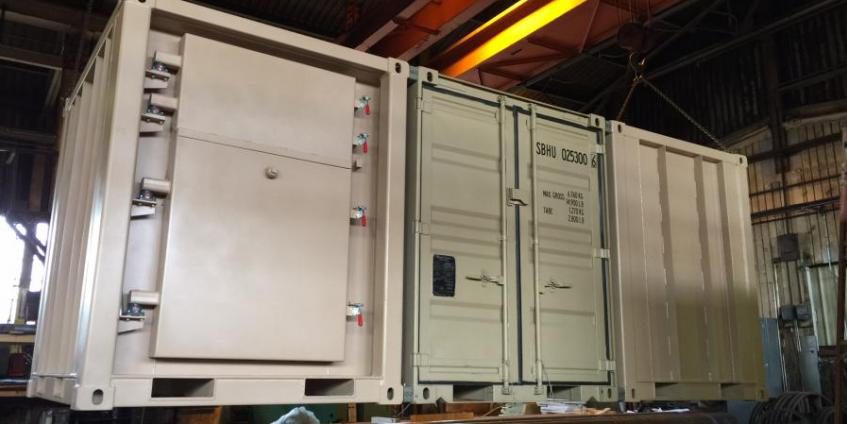In cooperation with the U.S. Army Research Development and Engineering Command, Army Research Laboratory (ARL), and Air Force Civil Engineer Center (AFCEC), Eco Waste Solutions (EWS), http://ecosolutions.com, demonstrated a Deployable Waste-to-Energy Conversion (DWEC) system at Tyndall Air Force Base, Florida, on January 12, 2017. The event provided government and industry personnel with a first-hand demonstration of simple and effective destruction of waste as well as the production of hot water.
The DWEC evolved from systems EWS currently produces for military and civilian use and represents a more cost-effective and efficient system specially designed for expeditionary waste disposal. Combined with the optional Heat Energy Recovery System (HERS), the DWEC produces a net energy benefit in the form of potable hot water for showers, kitchens, or laundry. The DWEC is a simple, easy-to-use, containerized waste management system that can be deployed for use at a forward-operating base (FOB) to manage waste on-site without the air pollution and health effects of open-pit burning. It requires less fossil fuel, has a lower logistical footprint, and produces a net energy benefit. The system had undergone previous testing by the Contingency Base Waste-to-Energy Standardized Testing Program of the U.S. Army Natick Soldier Research Development and Engineering Center and ARL with the cooperation of the AFCEC.
Problem
U.S. Department of Defense forward operations generate significant amounts of waste that must be treated properly to avoid exposure of personnel to the waste and its inherent hazards. Expedient methods such as burn pits pollute the air, water, and land and can have a long-term impact on the troops as well as the local population. Incinerators are the only proven commercial systems that reliably address this problem. However, those currently available do not meet emerging requirements for resource and energy efficiencies. Improvements to existing designs are needed to lower fuel consumption, reduce the logistical footprint, and recover energy.

https://ecosolutions.com/
Approach
The Eco Mobile DWEC is a simple, easy-to-use, containerized waste management system that can be deployed for use at a FOB to manage waste on-site without the air pollution and health effects of open-pit burning. DWEC requires less fuel, has a smaller logistical footprint than systems currently in use, and produces a net energy benefit. It evolves from the systems EWS currently produces for military and civilian use and represents a more cost-effective and efficient system, specially designed for expeditionary waste disposal. Combined with the optional HERS the DWEC produces a net energy benefit in the form of potable hot water for showers, kitchens, or laundry.
Results
- Installed and operational within 1 day, requiring only 2 persons.
- Each Tricon module weighs less than 10,000 lb and can be lifted using a forklift.
- Meets 100% of the waste disposal needs of a 150-250-person base camp.
- Produces enough energy to deliver all of the hot water needs for hygiene, kitchen, laundry, and other uses for a 250-person camp. (Replaces the need to use JP8-fired hot water heaters.)
- Uses 50% less fuel than comparable waste disposal systems.
- Best-in-class air emissions.
- Waste volume is reduced by over 96%. Ash residue is nonhazardous.


https://ecosolutions.com/
Specifications
- Waste Processing Rate: 1000 lb of solid nonhazardous military base waste in 24 hours
- Volume Reduction: >96%
- Labor Requirement: One person for 1 to 2 hours per day for inspection, loading, and ash removal (not required to attend the system during operation).
- Energy Savings: Uses 50% less fuel than comparably sized systems fielded today.
- Energy Production: Up to 3000 gallons per day of hot water (ÄT=84 °F), saving 20 gallons of fuel per day.
- Optional Features: Capability to use waste oil as a fuel.
Configuration
- The waste disposal module is designed to operate with or without the energy recovery module.
- DWEC Waste Disposal Unit (Eco Mobile): 3 interconnecting Tricon ISO containers (<10,000 lb each); footprint: 20’ x 8’ x 8’.
- HERS Energy Recovery Feature: 3 interconnecting Tricon ISO containers (<10,000 lb each); footprint: 20’ x 8’ x 8’ (tank modules not shown).
Process Description
The Eco Mobile/DWEC process is significantly different from traditional incineration, as it produces dramatically lower air emissions. The process utilizes EWS’s proprietary waste conversion technology—starved air gasification of the waste followed by excess air oxidation of the gas generated in the conversion process, with a unique process control system that automates every aspect of the process.
Contact Information
For more information, please contact:
Jean Lucas, Executive Vice President
jlucas@ecosolutions.com
T: 440.209.3010 ext. 230
Eco Waste Solutions – Canada
14-5195 Harvester Road
Burlington, ON L7L 6E9
T: 905.634.7022
Eco Waste Solutions – USA
300 Huron Street
Elyria, OH 44035
T: 440.209.3010


